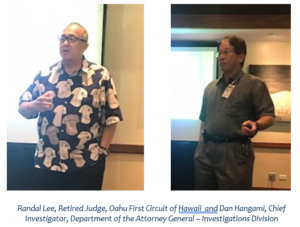2018 March Luncheon
September 1, 2018
We were honored to have two speakers at our March luncheon, discussing Government Corruption and Privacy Relating to Financial Accounts. Both Judge Randal Lee and Chief Special Agent Dan Hanagami have distinguished careers, and have been involved in a number of high-profile, white-collar crime cases in Hawaii over the years.
Government Corruption
The Depart of Attorney General, State of Hawaii has the power to investigate corruption in State and County government personnel; criminal and administrative; State and County law enforcement, criminal and administrative; crimes that focus the State as the primary target; crimes that focus on government employees in their capacity as employees; campaign spending violations; Department of Agriculture prohibited species; Department of Health Recyclables; part of State Law Enforcement Coalition; and address organized takeover of State property.
In the case of a Honolulu police officer who solicited a prostitute, the corruptive matter at hand was the utilization of police powers, equipment, resources, while on duty to commit the act of prostitution; unauthorized use of computer system. The case was investigated in partnership with the FBI, Homeland Security Investigation, and Honolulu Police Department (Professional Standards Office).
Corruption can occur anywhere in the world. Some recent cases outside of Hawaii include:
- The resignation of Japan’s National Tax Agency Commissioner Sagawa Nobuhisa, who was involved in a controversial discount state land sale to private school operator Moritomo Gakuen when he was a senior Ministry of Finance official.
- Mauritian President Ameena Gurib-Fakim, Africa’s only female head of state, is expected to resign after being accused of using a bank card provided by a charity to make personal purchases worth tens of thousands of dollars. The bank card had been provided as part of her work as an unpaid director for the charity.
- In the private sector, Kobe Steel Co. CEO Hiryoa Kawasaki and other top managers after admitting that it falsified inspection data about metal it supplied to makers of planes, cars and other products, to make them appear to meet customer specifications.
Privacy in Financial Accounts
In 1990, the Hawaii Supreme Court adopted a ruling by the U.S. Supreme Court that a defendant did not have a legitimate expectation of privacy in bank records because they were considered records of the bank and not private papers of the account holder. Such records contain information voluntarily conveyed to banks and expoosed to their employees in the ordinary course of business.
Thus, the reasoning went, the depositor takes the risk that the information will be conveyed to the government. That has changed with the advent of the Internet and the Digital Age.
In 2014, in a case where key information was obtained through a store membership card, the Hawaii Supreme Court ruled that the person had an expectation of privacy in a store customer reward card, as it is currently impossible to participate in the economic life of contemporary society without maintaining a bank account. Thus, permitting a police officer to acess these records without judicial control opens the door very real abuses of police power. Those who disclose certain facts to a bank or phone company for a limited business purpose need not assume that this information will be released to other persons for other purposes.
Questions to consider based on legal precedents:
- Does the individual have a legitiamate expectation that such information would not be shared with others?
- Does the information reveal “intimate details of a person’s life”?
- Did the individual release the information to a third party to obtain a necessary service?
- Were there realistic alternatives to disclose the information, i.e. would such disclosure jeopardize an individual’s sense of security?
- If information is deemed to be protected, the police must obtain a warrant before conducting such searches.
